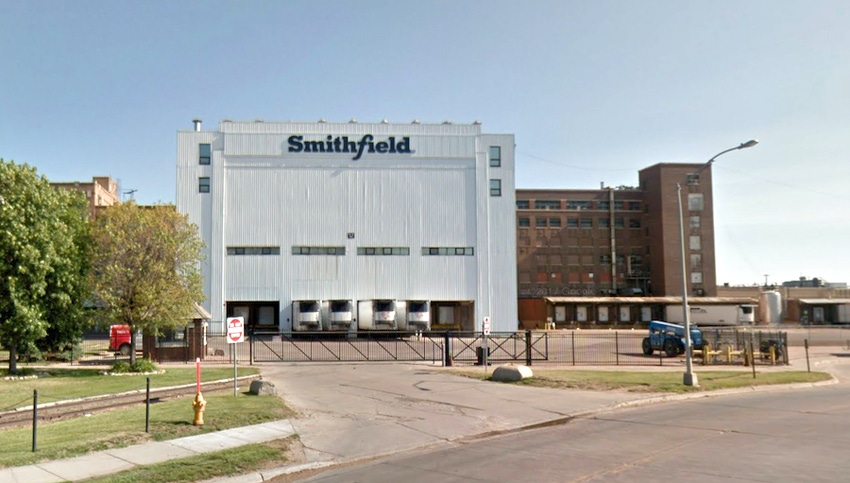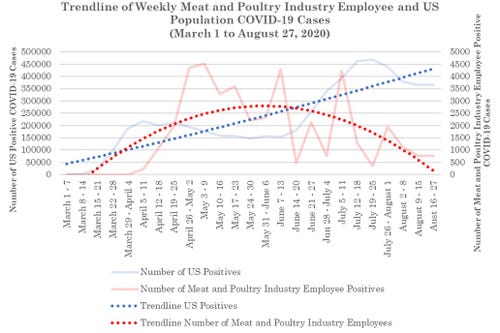NAMI argues that citations were issued during time of confusion over which measures were effective in stopping spread of virus.

In recent days, the U.S. Department of Labor’s Occupational Safety & Health Administration (OSHA) cited JBS Foods Inc. in Greeley, Colo., and Smithfield Packaged Meats Corp. in Sioux Falls, S.D., for failing to protect employees from exposure to the novel coronavirus. OSHA proposed $15,615 in penalties for JBS and a penalty of $13,494 for Smithfield -- the maximum allowed by law. However, in reviewing the timeline of events, those citations were issued during a time of great unknowns for the meat processing industry.
In a statement, OSHA cited Smithfield for one violation of the general duty clause for failing to provide a workplace free from recognized hazards that can cause death or serious harm. At least 1,294 Smithfield workers contracted COVID-19, and four employees died from the virus in the spring of 2020.
Based on a coronavirus-related inspection, OSHA cited JBS – operating as Swift Beef Co. – for a violation of the general duty clause for failing to provide a workplace free from recognized hazards that can cause death or serious harm. The penalty assessed for the general duty clause violation is the maximum allowed by law. The company also failed to provide an authorized employee representative with injury and illness logs in a timely manner following OSHA’s May 2020 inspection.
Both of the citations cite allegations of “proximity,” but the timeline starts during a period of national and international confusion over which measures were effective in stopping the spread of COVID-19.
The North American Meat Institute (NAMI) said in a statement that the meat and poultry industry remains vigilant in working with the government to stop the spread of the virus, and OSHA engages in “revisionism.”
“Not until April 3 did the CDC reverse its guidance and tell people to wear masks. Early in the pandemic, PPE [personal protective equipment] and testing were difficult to obtain, and some states, including South Dakota, were not issuing lockdown instructions to residents,” NAMI said, noting that it wasn't until April 26 that CDC/OSHA released "their joint guidance specific to the meat and poultry industry, but OSHA’s citation faults Smithfield and JBS beginning back on March 22 and March 25 respectively, prior to CDC recommendations to wear a mask, but most important, prior to issuing their own guidelines for the industry.”
NAMI president and chief executive officer Julie Anna Potts stated, “The meat and poultry industry’s first priority is the safety of the men and women who work in their facilities. Notwithstanding inconsistent and sometimes tardy government advice (‘don’t wear a mask/wear a mask’/April 26 OSHA guidance specific to the meat and poultry industry) when the pandemic hit in mid-March, meat and poultry processing companies quickly and diligently took steps to protect their workers. Companies had to overcome challenges associated with limited personal protective equipment, they implemented screening systems to keep sick employees out of plants and developed COVID-19 plans with administrative and engineering controls to protect workers, which included, but were not limited to, the CDC/OSHA guidelines.”
In a review of the timeline of events, NAMI noted that on April 2-3, President Donald Trump issued executive orders using the Defense Production Act to accelerate production of respirators and ventilators and an order to prevent domestic manufacturers from exporting PPE. The media began to report on nationwide shortages of masks and PPE.
Then, on April 3, CDC reversed its policy on masks and recommended face coverings to help stop the spread of the virus.
On April 12, Smithfield's Sioux Falls plant closed. The company detailed all of the measures it had already implemented to protect and support employees. “These include mandatory, 14-day, COVID-19-related quarantines with pay as an uncompromising effort to protect its dedicated employees," the timeline explained. "The company has also relaxed attendance policies to eliminate any punitive effect for missing work due to COVID-19 diagnosis or quarantine. In addition, Smithfield is taking many measures to minimize its team members’ risks of contracting COVID-19. These include adding extra hand sanitizing stations, boosting personal protective equipment, continuing to stress the importance of personal hygiene, enhancing cleaning and disinfection, expanding employee health benefits, implementing thermal scanning, increasing social distancing, installing plexiglass and other physical barriers and restricting all non-essential visitors.”
On April 9, the U.S. Department of Agriculture's Food Safety & Inspection Service inspectors were allowed to make their own face coverings due to the difficulty in obtaining masks.
By April 13, JBS USA announced the closure of its Greeley beef facility and detailed the efforts it had enacted prior to this closure to stop the spread of the virus, explaining, “To date, JBS USA has adopted the following safety measures, health protocols and worker benefits at all its facilities: increasing sanitation and disinfection efforts, including whole facility deep cleaning every day; promoting physical distancing by staggering starts, shifts and breaks and increasing spacing in cafeterias, break and locker rooms, including plexiglass dividers in key areas; dedicating staff to continuously clean facilities; temperature testing all team members prior to entering our facilities, including the use of hands-free thermometers and thermal imaging testing technology in many locations; providing extra personal protective equipment, including protective masks that are required to be worn at all times; removing vulnerable populations from our facilities, offering full pay and benefits; requiring sick team members to stay home from work; waiving short-term disability waiting periods; relaxing attendance policies so people don’t come to work sick; providing free 100% preventative care to all team members, [and] offering free LiveHealth Online services that allow for virtual doctor visits at no cost.”
On April 14 and 16, CDC's National Institute for Occupational Safety & Health (NIOSH) inspected the JBS Greeley facility, and on April 24, JBS reopened Greeley.
On April 26, which was 13-15 days after the Sioux Falls and Greely plants closed, OSHA and CDC issued guidance for meat and poultry processing and acknowledged several times that it is not possible in every circumstance in a plant for employees to work 6 ft. apart.
On April 28, OSHA solicitor of labor Kate O’Scannlain and principal deputy assistant secretary Loren Sweatt issued a Statement of Enforcement Policy regarding meat and poultry processing facilities that says, “To the extent employers determine that certain measures are not feasible in the context of specific plants and circumstances, they are encouraged to document why that is the case. … In the event of an investigation, OSHA will take into account good-faith attempts to follow the Joint Meat Processing Guidance. OSHA does not anticipate citing employers that adhere to the Joint Meat Processing Guidance.”
On May 7, CDC inspected the Smithfield Sioux Falls facility, and the plant resumed full operations by May 11.
NAMI said, "It is easy to issue a quick fine and write the story of 'big company gets small fine' when, in reality, the story is 'big company faces unprecedented public health crisis' at a time of great unknowns and conflicting advice in an attempt to make the food on which our nation relies."
While positive cases of COVID-19 associated with meat and poultry workers are diminishing, "it takes vigilance to maintain that trend, and meat and poultry companies will do everything to ensure this trend continues," NAMI noted.

About the Author(s)
You May Also Like



.png?width=300&auto=webp&quality=80&disable=upscale)

